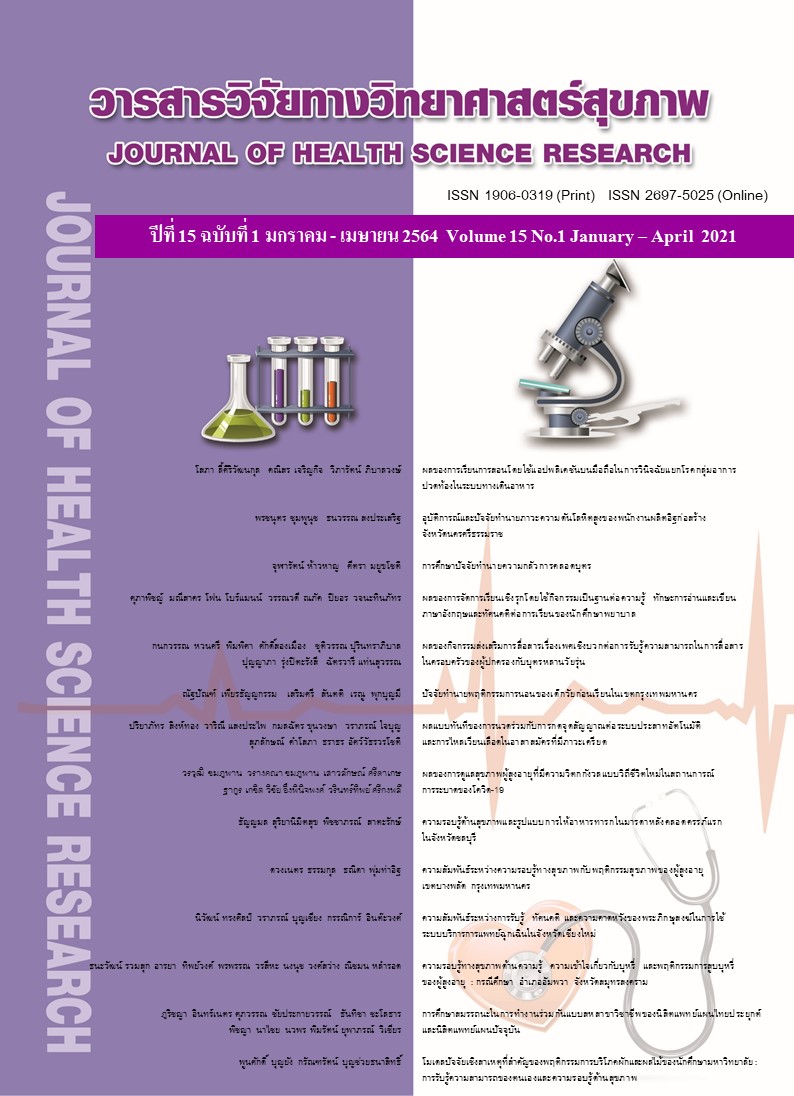ความรอบรู้ด้านสุขภาพและรูปแบบการให้อาหารทารก ในมารดาหลังคลอดครรภ์แรกในจังหวัดชลบุรี
Main Article Content
บทคัดย่อ
บทนำ : ความรอบรู้ด้านสุขภาพเป็นทักษะทางปัญญาและสังคมที่กำหนดแรงจูงใจและความสามารถของมารดาเพื่อส่งเสริมและธำรงการมีสุขภาพดีของตนเองและทารก
วัตถุประสงค์การวิจัย : เพื่อศึกษาความรอบรู้ด้านสุขภาพและรูปแบบการให้อาหารทารกของมารดาหลังคลอดครรภ์แรก และเปรียบเทียบความรอบรู้ด้านสุขภาพของมารดาหลังคลอดครรภ์แรกที่มีรูปแบบการให้อาหารทารกแตกต่างกัน
วิธีการวิจัย : การวิจัยเชิงพรรณนา ตัวอย่างเป็นมารดาหลังคลอด 6 เดือน ที่พาบุตรมารับบริการฉีดวัคซีน ที่คลินิกเด็กสุขภาพดี ซึ่งตอบคำถามครบถ้วนสมบูรณ์ทั้งหมด 154 คน เครื่องมือที่ใช้ในการเก็บข้อมูล ได้แก่ แบบสอบถามข้อมูลทั่วไป และแบบวัดความรอบรู้ด้านสุขภาพคนไทย วิเคราะห์ข้อมูลด้วยสถิติพรรณนา และการวิเคราะห์ความแปรปรวนแบบทางเดียว
ผลการศึกษา : มารดาหลังคลอดครรภ์แรกในจังหวัดชลบุรี มีความรอบรู้ด้านสุขภาพโดยภาพรวม อยู่ในระดับพอใช้ได้ และมารดาหลังคลอดที่มีรูปแบบการให้อาหารทารกแตกต่างกัน มีความรอบรู้ด้านสุขภาพแตกต่างกันอย่างมีนัยสำคัญทางสถิติที่ระดับ .05
สรุปผล : มารดาหลังคลอดที่มีรูปแบบการให้อาหารทารกแตกต่างกันมีความรอบรู้ด้านสุขภาพแตกต่างกันอย่างมีนัยสำคัญทางสถิติ พยาบาลควรส่งเสริมความรอบรู้ด้านสุขภาพของมารดาตั้งแต่ในระยะตั้งครรภ์โดยเฉพาะการเข้าถึงข้อมูลและบริการสุขภาพ การสื่อสาร และการสนับสนุนทางสังคม เพื่อให้มารดาหลังคลอดมีความรอบรู้ด้านสุขภาพเพิ่มขึ้น
Downloads
Article Details
บทความที่ได้รับการตีพิมพ์เป็นลิขสิทธิ์ของวิทยาลัยพยาบาลบรมราชชนนี จังหวัดนนทบุรี
ข้อความที่ปรากฏในบทความแต่ละเรื่องในวารสารวิชาการเล่มนี้เป็นความคิดเห็นส่วนตัวของผู้เขียนแต่ละท่านไม่เกี่ยวข้องกับวิทยาลัยพยาบาลบรมราชชนนี จังหวัดนนทบุรี และคณาจารย์ท่านอื่น ในวิทยาลัยฯ แต่อย่างใด ความรับผิดชอบองค์ประกอบทั้งหมดของบทความแต่ละเรื่องเป็นของผู้เขียนแต่ละท่าน หากมีความผิดพลาดใด ๆ ผู้เขียนแต่ละท่านจะรับผิดชอบบทความของตนเองแต่ผู้เดียว
เอกสารอ้างอิง
The National Statistical Office (NSO) and united nations children’s fund (UNICEF) in Thailand. Survey of the situation of children and women in Thailand 2015-2016 (complete report). [internet]. 2016 [cited 2019 Feb 9]; Available from: https://www. unicef.org/thailand/th/reports (in Thai).
Cetthkrikul N, Topothai C, Topothai T, Pongutta S, Kunpeuk W, Prakangai P, et al. Situation of breastfeeding among mothers receiving services in Public Hospitals in Thailand. Journal of Health Science. 2016;25(4):657-68. (in Thai).
Jintrawet U, Tongsawas T, Somboon L. Factors associated with the duration of exclusive breastfeeding among postpartum mothers. Nursing Journal. 2014;41(1):133-44. (in Thai).
Wangsawat T, Kaleang N, Phibal A, Jaisomkom R, Hayeese W. Factors Influencing Intention to Exclusive Breastfeeding for 6 Months of Mothers in Naradhiwat Province. Nursing Journal. 2014;(1):123-33. (in Thai).
Tangsuksan P, Ratinthorn A. Experiences and contextual factors related to exclusive breastfeeding in full – time working mothers. Journal of Nursing Science. 2011;29(3):52-63. (in Thai).
Winichagoon P, Damrongwongsiri O. Breastfeeding situation, facilitators and obstacles, policy and program to promote breastfeeding in Thailand. Journal of Nutrition Association of Thailand. 2020;55(1):66-81. (in Thai).
Intarakamhang U. Creating and Developing of Thailand Health Literacy Scales. Bangkok: Behavioral Science Research Institute (BSRI); Sponsored by Department of health service support. 2017. (in Thai).
Mulyani S, editor. Maternal health literacy towards the readiness of exlusive breastfeeding. 2nd International Seminar on Global Health; 2018:123-7.
Yin HS, Johnson M, Mendelsohn AL, Abrams MA, Sanders LM, & Dreyer, BP. The health literacy of parents in the United States: A nationally representative study. Pediatrics. 2009; 124(Suppl 3):S289-98. doi: 10.1542/peds.2009-1162E.
DeWalt DA, Hink A. Health literacy and child health outcomes: a systematic review of the literature. Review pediatrics. 2009;124(Suppl 3):S265-74. doi: 10.1542/peds.2009-1162B.
Harrington KF, Zhang B, Magruder T, Bailey WC, Gerald LB. The impact of parent's health literacy on pediatric asthma outcomes. Pediat Aller Imm Pul. 2015;28(1):20–6. doi: 10.1089/ped.2014. 037900.
Berkman ND, Sheridan SL, Donahue KE, Halpern DJ, Crotty K. Low health literacy and health outcomes: An updated systematic review. Ann Intern Med. 2011;155(2):97‑107. doi: 10.7326/0003-4819-155-2-201107190-00005.
Guntzviller LM, King AJ, Jensen JD, Davis LA. Self‑efficacy, health literacy, and nutrition and exercise behaviors in a low‑income, Hispanic population. J Immigr Minor Healt. 2017;19(2):489‑93. doi: 10.1007/s10903-016-0384-4.
Oldach BR, Katz ML. Health literacy and cancer screening: a systematic review. Patient Educ Couns. 2013;94(2):149–157. doi: 10.1016/j.pec.2013.10.001.
Mirjalili N, Ansari Jaberi A, Ansari Jaberi, K, Negaban Bonabi T. The role of maternal health literacy in breastfeeding pattern. J Nurs Midwifery Sci. 2018;5(2): 53-8. doi: 10.4103/JNMS.JNMS_21_18.
Stafford JD, Lathrop E, Haddad L. Health literacy and associated outcomes in the postpartum period at grady memorial hospital. Obstet Gynecol. 2016;127:66 S‑7S. doi: 10.1097/01.AOG.0000483913.45246.45.
Tsai TI, Huang SH, Lee SY. Maternal and hospital factors associated with first-time mothers’ breastfeeding practice: A prospective study. Breastfeed Med. 2015;10(6):334-40. doi: 10.1089/bfm. 2015.0005.
Wang A, Scherpbier RW, Huang X, Guo S, Yang Y, Josephs‑Spaulding J, et al. The dietary diversity and stunting prevalence in minority children under 3 years old: A cross‑sectional study in forty‑two counties of Western China. Brit J Nutr. 2017;118(10):840‑8. doi. 10.1017/S 0007114517002720.
Kasemsuk K, Boonbunjob U. Health promotion of early adulthood development: nurses’ important role. Royal Thai Air Force Medical Gazette. 2018;64(3):101‑7. (in Thai).
Cetthakrikul N, Topothai C. Study of lactation consultant’s services in health facilities in Thailand. Journal of Health System Research. 2019;13(4):368‑82. (in Thai).
Teerarojanapong P. The strength of family institution and the economy in present era. Journal of Rattana Bundit University. 2012;7(1):17-26. (in Thai).


